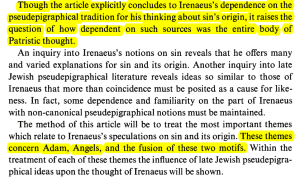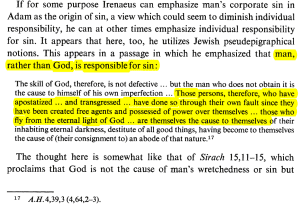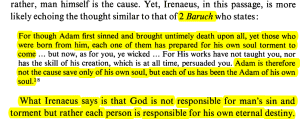Readers of this blog know that several people who’ve commented in the past about my views on Romans 5:12 have thought that plain reading of the text out of step with traditional Christianity. Below is an article (not publicly accessible) that shows that Irenaeus wrote several things that are consistent with my take (humans are sinners estranged from God because of their own guilt, not Adam’s) and which are in step with the 2nd Temple Jewish view of how evil/sin proliferated throughout the human race due to the sin of the Watchers (“sons of God”) in Gen 6:1-4.
D. R. Schultz, “The Origin of Sin in Irenaeus and Jewish Pseudepigraphical Literature,” Vigiliae Christianae, Vol. 32: 3 (Sep., 1978), pp. 161-190
In a nutshell, the view of all this that’s consistent with the biblical text taken in its own context is that sin began in Eden (the first divine and human rebellions), which estranged humanity from God because all humans were then cut off from the divine presence and would invariably and inevitably sin. However, the worldwide depravity known to Christian theology occurs in the wake of the sin of the Watchers (which has a “causative” effect in the sense that 2nd Temple material views the sin of the Watchers, by example and by design, as a catalyst to human rebellion on a grand scale). The proliferation of sin and a human’s individual guilt before God is not laid at the feet of Adam.
I would point out that, in the stream of orthodox Christian theology, Irenaeus was obviously no heretic.
Though the article by Schultz is not publicly accessible, the PhD dissertation he wrote upon which that journal article is based is:
D. R. Schultz, “The Origin of Sin in Irenaeus and Jewish Pseudepigraphical Literature,” PhD thesis, McMaster University, 1972 (216 pp)
*Note: the link will ask you to save the file named “full text” — just save it and then open and rename it. It’s all there and web-accessible.
Here are some screen shots of the shorter article (click on them for emlarged viewing):








Good thoughts.
2 Bar 56:10: “For he who was a danger to himself was also a danger to the angels.”
Nice, Gabe!
Mike, if we are not counted as guilty in Adam, what becomes of being counted righteous in Jesus?
To deny original guilt seems equivalent to denying federal headship. But federal headship is the mechanism for forensic justification. So aren’t you transitively denying forensic justification?
Nothing in principle. I don’t hold to federal headship or seminal headship. Justification is about being placed in Christ by grace through faith. You don’t need a particular view of headship for that. In other words, the fact that so many have talked about justification using that template doesn’t mean that’s an exegetically coherent position.
Dominic, the problem with your comparison; if imputation from Adam is nullified (death) for man, then imputation from Christ would be undermined (life) as well, is Romans 4 makes it clear that the justification for the two imputations (accounting or crediting of both deposits and debits) are different. The Wage of sin is merited, and by merited, Paul makes it clear that it was necessarily personally and intentionally *earned* by the recipient, but the Gift of God is unmerited; gracious or a mercy. To equate the two would have Adam’s wage (death) imputed to man UNMERITED, and this violates Romans 6:23 and many, many other passages, both in Romans and the rest of the Bible.
Bottom line, the forced imputation of guilt unmerited is by definition Illegal “unrighteous judgment” and is condemned through Jewish Law and in the New Testament, especially by Paul.
Am I wrong to say that the Torah is the center of the Israelite religion? If this is correct, (even if not this question still stands), why doesn’t the text mention any anger towards the Watchers for proliferating sin? Why is it right after the incidence in Genesis, God aims his anger towards man alone and man is responsible for the coming flood. Is this question something 2nd temple Jews were bothered with as well? Do the apocrypha try to answer this question and sort of “fill in the gaps”? One would think the Tanakh would mention something about God’s anger toward them for what they have done to man.
Short answer: because all that’s going on in a writer’s and reader’s belief system doesn’t need to be inscripturated for it to still be true. In other words, not everything a writer or reader would have believed needs to be spelled out. If Annus is correct (and the data are compelling), anyone who knew about the original Mesopotamian context for Gen 6:1-4 would have believed God was angry. That anger is implicit in Rephaim passages in the OT (the spirits of the Watchers’ offspring wind up in Sheol/hell as bad guys — like the post-flood apkallu). That theme is given more space/detail in 2nd temple texts.
We have to remember that 2nd temple material not in the canon (and Jews had a fluid view of that — oral vs. written Torah, for example) was not saying “let’s write stuff totally contrary to the Torah.” Rather, much of it is a reading of the Torah, or a “supplementation” of Torah — viewed as consistent with the Torah.
As a former Eastern Orthodox Christian, I can tell you that the Eastern Orthodox Church (EOC) does not believe in the Catholic/Protestant view of Original Sin, or inheriting Adam’s Guilt. They believe in something called Ancestral Sin. The EOC claims a tradition and heritage older than the Catholic and Protestant Church. The big break between East and West on this subject was with Augustine. Augustine used a faulty Latin translation and was steered off course when he was debating Pelagius. Thus, Augustine determined the entire course of the West with his reasoning. The Greek (as Dr. Heiser has pointed out in his previous posts) says something much different. Protestants of course (i.e., the great minds of the Reformation such as Luther and Calvin) kept somethings from the Catholic tradition, with Original Sin/Adam’s Guilt being some of them. The position of the EOC about this can be easily researched online. A great primer about this is the book “The Ancestral Sin” by EOC priest John Romanides (d. 2001). Needless to say, your research and position Dr. Heiser is substantiated and supported by the entire EOC who claim this position to be as old as the EOC itself. Just think of the psychological and spiritual burden this lifts off folks who have lost loved ones who are incapable of receiving the Evangel (i.e., infants or the mentally impaired). The doctrine of Ancestral Sin is (to me and the EOC, and may I add you to that number Dr. Heiser) so simplistic and coherent that it provides greater explanatory power for issues such as infant baptism (its necessity for salvation) or the fate of the innocent (the destination of infants and the mentally impaired). It also does away with elaborate, complex, and downright ridiculous (though ingenious) polemics that try to explain how a good God can either: (1) compromise His nature by allowing guilty souls into Heaven, or (2) toss babies and the mentally impaired into Hell. I believe this is an important topic that can have a great impact on one’s worldview, especially where lost loved ones are involved.
I’ve not looked into the EOC view on this, though I’ve heard this before. I’ll have to give it a look at some point. I’ve run across the idea a few times in other places — basically, scholars who are (like me) discontent with the dominant view (which overlooks the problems it creates).
Carlitos, as I understand the EOC’s position, and please correct me if I’m wrong, but Ancestral Sin references a circumstantial consequence of a parent’s sin upon the child [Gen 3:17-19 and Exo 20:5-6]. The model generally holds that Adam’s sin, though not personally guilty of sin at birth, due to the disfigurement of man’s image, the fallen state of creation, and the brokenness of Adam’s relationship with God, all children of Adam will (must) sin (a paraphrase of John Karmirs’ description of EOC’s doctrine)
The problem with this model is the universality of sin, the hopelessness of Adam’s progeny to live within God’s law, and the absolute certainty of their ultimate and inevitable damnation. Because of this man becomes a victim of another’s actions; either God or Adam, and is, like the man who “fell among thieves” stripped, beaten and left for dead; Luke 10:29-. He is *owed* mercy by God’s law; i.e.. man would necessarily *merit* salvation.
Thanks